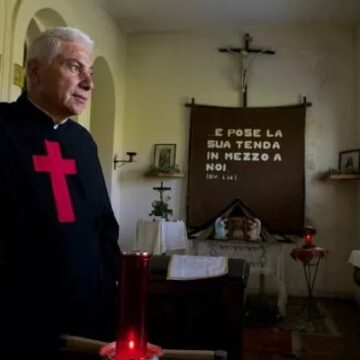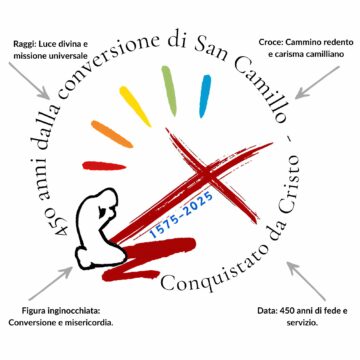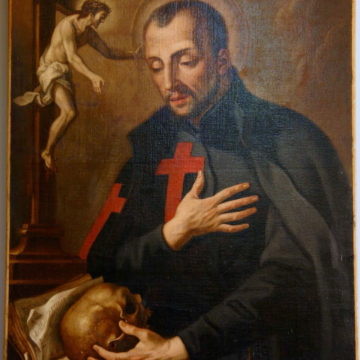 By Don Tonino Bello
By Don Tonino Bello
Real sadness is not when, in the evening, there is nobody waiting for you when you return home, but when you no longer expect anything from life.
And you suffer the darkest loneliness not when you find the hearth fire out but when you no longer want to light it, not even for a passing guest.
When you think, that is to say, that for you the music has stopped. And by now the game is over. And no living soul will come to knock at your door. And there will no longer be somersaults of joy because of good news or starts of amazement because of some unforeseen event. And not even shivers of pain because of a human tragedy – for that matter there is nobody left for whom you should have fears.
So life flows in a flat way towards an epilogue that never arrives, like a tape that has finished a song too early, and winds interminably, without saying anything else, towards the last pause.
Waiting: that is to say experiencing a zeal for living. Did they not perhaps say that the holiness of a person is measured by the weight of his waiting. Perhaps that is true.
If such is the case, one must conclude that Mary is the holiest of creatures specifically because the whole of her life was marked by the joyful rhythms of a person who is waiting for someone.
The initial description with which the pen of Luke identifies her is full of expectations: ‘the betrothed of a man from the house of David’. A fiancée that is to say.
Nobody fails to understand to what harvest of hopes and heartbeats which every woman experiences as a prelude to mysterious tenderness that word alludes. Even before her name is mentioned in the gospel, it is said that Mary was engaged to be married. A waiting virgin. Waiting for Joseph. Waiting for the rustle of his sandals, for the things of the evening when, with the scent of wood and paint, he will come to speak to her about his dreams.
But even in the last frame with which Mary takes her leave from Holy Scripture, she is seen by the camera as being in a state of waiting.
There, in the dining room, on the upper floor, in the company of the disciples, while awaiting the Spirit. Listening for the rustling of his wings, at the end of the day, when, scented with anointing and holiness, he would descend on the Church to point out to her, the mission of salvation.
A Virgin who Waits, at the Beginning
A Mother who Waits, at the End
And in the arch supported by these two trepidations, one that is very human and one that is very divine, are a hundred other yearning waits.
Waiting for him, for nine very long months. The waiting of performing legal obligations celebrated with fragments of poverty and the joys of kinship. Waiting for the day, the only day, that she would want to postpone again and again, when her son left home without ever coming back. The waiting for the hour: the only hour when she would not be able to contain her impatience and when, before the awaited time, she would pour the charge of grace onto the table of men. Waiting for the last death rattle of the only son nailed onto the wood. Waiting for the third day, lived in lonely watching, in front of the rock.
To wait: the infinitive of the verb to love. Indeed, in the vocabulary of Mary, to love infinitely.
St. Mary, the Virgin of waiting, give us your oil because our lamps are going out. Look: what we had in reserve has been used up. Do not send us to other sellers. Reignite in our souls the ancient fervour that burned inside us when a trifle was enough to make us jump with joy: the arrival of a distant friend, the red of the evening after a storm, the crackle of the log which during the winter watched over those who came home, the thundering bells during days of celebration, the arrival of swallows in spring, the acrid smell that came out of the crushing of olives, the autumnal singing that came from the millstones, the tender and mysterious curving of the maternal womb, and the scent of lavender that burst forth when a cradle was being prepared.
If today we no longer know how to wait, this is because we are short on hope. The springs have dried up. We are suffering from a deep crisis of desire. And by now satisfied by the thousand surrogates that besiege us, we run the risk of no longer expecting anything, not even those promises of beyond this world that were signed in the blood of the God of the covenant.
St. Mary, the woman of waiting, comfort the pain of mothers for their children who, leaving home one day, never came back because they are killed in a traffic accident or seduced by the calls of the jungle. Because lost because of the fury of war or sucked into the engines of the passions. Because overwhelmed by a tempest at sea or by the storms of life.
St. Mary, the woman of waiting, give us a vigilant soul. Having reached the threshold of the third millennium, unfortunately we feel more children of twilight than prophets of the advent. Sentry of the morning, restore to our hearts the passion of young announcements to take to the world. Lastly, bring us harp and zither, so that with you, early morning lady, we can wake up the dawn.
Faced with changes that shake history, grant that we may feel on our skin the trembling of beginnings. Make us understand that it is not enough to welcome – one must wait. To wait at times is a sign of resignation. To wait is always a sign of hope. Therefore, make us ministers of waiting. And the Lord comes: Virgin of the advent, surprise us, by your maternal taking part in this, with a lamp in your hand!











Camillians on Facebook
Camillians on Twitter
Camillians on Instagram